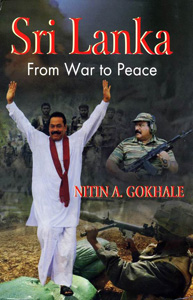 Gokhale says his book titled ‘Sri Lanka: From War to Peace’ is no scholarly analysis of the Sri Lankan conflict, but a chronicle of the unprecedented military campaign and the hows and whys of LTTE’s decline.
Gokhale says his book titled ‘Sri Lanka: From War to Peace’ is no scholarly analysis of the Sri Lankan conflict, but a chronicle of the unprecedented military campaign and the hows and whys of LTTE’s decline.Nitin A Gokhale, in his 26-year career as a journalist, has covered insurgencies in the North-East and Kashmir, the 1999 Kargil War, the Maoist upheavals and many other sensitive stories. But in his own words, his experience of covering the so-called Eelam War IV, which culminated with the killing of Velupillai Prabhakaran and virtual annihilation of the LTTE by a determined and ruthless Sri Lankan Army, was something completely different from what as a journalist he has experienced within India all these years.
Gokhale, who extensively covered the 33-month final war between the Sri Lankan Army and the LTTE, has just come up with a book titled ‘Sri Lanka: From War to Peace’. Gokhale says it is no scholarly analysis of the Sri Lankan conflict, but a chronicle of the unprecedented military campaign and the hows and whys of LTTE’s decline. Gokhale, a senior electronic media journalist, shares his experiences of covering the war and writing the book with Utpal Borpujari. Excerpts:
Were you able to cover the Eelam war as freely as you covered the Kargil war?
In Kargil, we never went beyond the highway! We could never climb the mountains and witness the actual combat but, yes, we were free to move around along the highway. In Sri Lanka, every trip to the battle zone was organised and controlled. In that sense there were restrictions.
Did the Lankan government’s control over media coverage help it to go in for the final ‘kill’ more ruthlessly?
Yes, it did. Controlled access to the battle zone meant less international pressure.
How difficult was it to retain objectivity in the light of the limited access to the war zone?
It was difficult but not impossible. One commented and reported according to one’s judgment and interpretation. No one interfered with that.
There were allegations that the Lankan army committed a lot of atrocities on Tamil citizens during the war. How far do you think those allegations are true?
Mostly exaggerated. War is a dirty business and it is no one’s case that the Lankan army did not commit excesses, but most reports were blown out of proportion.
India maintained almost complete silence during the final war. Do you think India played an indirect role?
India deliberately remained silent because of domestic political compulsions but as I have said in the book, India was in the loop at every step of the way and New Delhi also helped militarily, which is not very well-known publicly.
With Prabhakaran’s death, LTTE is virtually wiped out. How do you think the Lankan government should work to remove the feeling of alienation and step-motherly treatment among the Tamils?
Prabhakaran did not represent all of Tamils in Sri Lanka. This is the best chance for the Lankan government to remove the alienation among Tamils by giving them equitable political and social rights, and ensuring speedy rehabilitation and development of the northern and eastern areas.
Now that the armed rebellion is over, how do you think the Tamil civil society will try to get their demands fulfiled?
The Tamil society will have to reconcile to the fact that they will never get a merged north and eastern province but it can continue to fight politically. As recent election results in Vavuniya and Jaffna have shown, people can still spring a surprise or two.
Do you think the Sri Lankan method of total offence and controlled access to media in any way be implemented to tackle various insurgencies and Maoist activities in India?
The Lankan template of an all-out offensive cannot be applied in India totally. To begin with, none of the insurgent groups in India hold territory as the LTTE did. Neither do they have an active armed force like the LTTE. Secondly, the Indian media and society are far more open, vibrant and democratic than Sri Lanka’s. But yes, the Indian establishment is surely studying the Sri Lankan methods of dealing with militancies in a limited military way. The thinking now is: let’s weaken the insurgents to a point where they will be forced to negotiate from a position of weakness.
What do you think led to annihilation of the LTTE, which till recently was considered a very potent group?
Three reasons: one, the LTTE tried to become a conventional army instead of continuing to fight like a guerrilla force and tried to hold territory, which guerrilla forces never do. Second, it underestimated the resolve and skills of the Lankan armed forces this time and third, it did not have any international, including Indian support like in the past. (DH)-Sri Lanka Guardian











Post a Comment